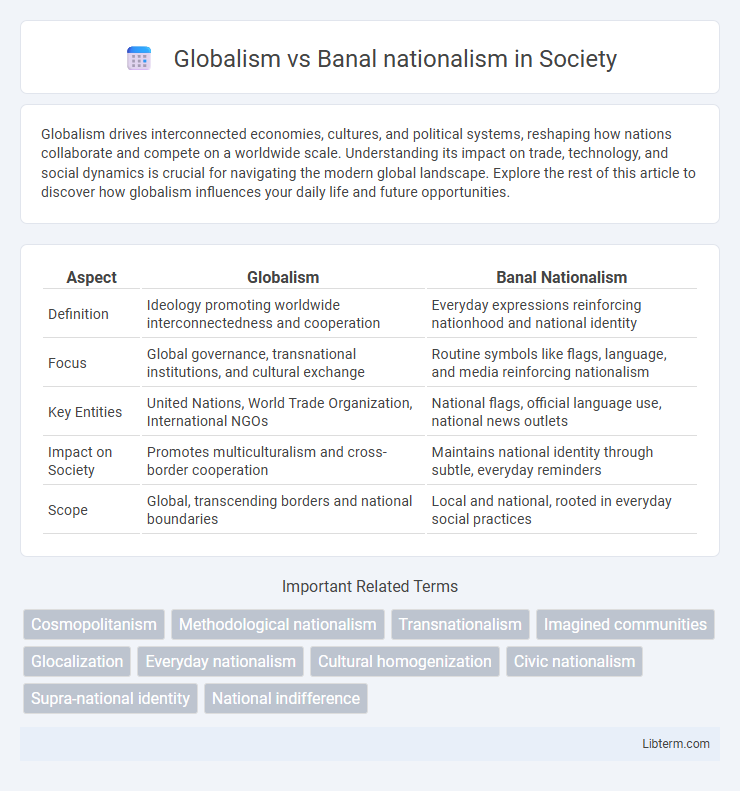Globalism drives interconnected economies, cultures, and political systems, reshaping how nations collaborate and compete on a worldwide scale. Understanding its impact on trade, technology, and social dynamics is crucial for navigating the modern global landscape. Explore the rest of this article to discover how globalism influences your daily life and future opportunities.
Table of Comparison
| Aspect | Globalism | Banal Nationalism |
|---|---|---|
| Definition | Ideology promoting worldwide interconnectedness and cooperation | Everyday expressions reinforcing nationhood and national identity |
| Focus | Global governance, transnational institutions, and cultural exchange | Routine symbols like flags, language, and media reinforcing nationalism |
| Key Entities | United Nations, World Trade Organization, International NGOs | National flags, official language use, national news outlets |
| Impact on Society | Promotes multiculturalism and cross-border cooperation | Maintains national identity through subtle, everyday reminders |
| Scope | Global, transcending borders and national boundaries | Local and national, rooted in everyday social practices |
Defining Globalism and Banal Nationalism
Globalism refers to the ideology and process promoting increased interconnectedness and interdependence among countries through economic, political, and cultural exchanges, emphasizing a borderless world. Banal nationalism describes the everyday, often unnoticed symbols and practices--such as flags, national anthems, and media--that reinforce a sense of national identity and belonging in routine life. While globalism stresses supra-national integration, banal nationalism underlines the persistent significance of national identity in maintaining social cohesion within states.
Historical Origins of Globalism and National Identity
Globalism emerged in the late 20th century as a response to increased economic interdependence, technological advancements, and cultural exchanges driven by globalization. National identity, shaped by banal nationalism, consists of everyday practices and symbols that reinforce a sense of belonging to a nation-state, rooted in historical narratives and collective memory. The tension between globalism's expansive outlook and banal nationalism's focus on local identity reflects deeper historical processes of state formation and globalization.
Key Characteristics of Banal Nationalism
Banal nationalism is characterized by everyday representations of the nation that subtly reinforce national identity without overt displays of patriotism, including flags on currency, official language use, and national sports broadcasts. These mundane symbols operate continuously in a citizen's daily life, embedding national consciousness through routine interactions rather than explicit political rhetoric. This contrasts with globalism, which emphasizes transnational cooperation and de-emphasizes traditional national boundaries and identities.
The Rise of Globalism in the 21st Century
The rise of globalism in the 21st century is characterized by increased economic interdependence, transnational corporations, and digital communication technologies reshaping international relations. This shift challenges banal nationalism, which refers to the everyday representations and symbols that sustain national identity in routine life. As globalism expands, the tension between global interconnectedness and persistent national loyalties intensifies, influencing political, cultural, and social dynamics worldwide.
Globalism’s Impact on Local Cultures
Globalism significantly reshapes local cultures by promoting interconnectedness and cultural exchange, often leading to hybrid identities and the diffusion of global norms. This process can dilute traditional practices and languages, raising concerns about cultural homogenization and loss of uniqueness in local communities. However, local cultures sometimes adapt by integrating global influences selectively, fostering new expressions of identity that reflect both global and local elements.
Media’s Role in Reinforcing Banal Nationalism
Media outlets play a crucial role in reinforcing banal nationalism by embedding subtle national symbols and cultural references in everyday content, such as news broadcasts, sports coverage, and advertisements. This constant, low-level exposure to national identity helps normalize and perpetuate a collective sense of belonging and patriotism without overt political messaging. By contrast, globalism challenges these narratives but often struggles to gain similar emotional resonance in media representation, making banal nationalism a dominant force in shaping public perceptions of national identity.
Economic Implications: Globalism vs National Interests
Globalism promotes economic integration through free trade agreements, multinational corporations, and global supply chains, boosting overall growth but often undermining national industries and labor markets. Banal nationalism emphasizes protecting domestic economies via tariffs, subsidies, and regulatory policies aimed at safeguarding national jobs and industries, potentially leading to trade tensions and reduced international cooperation. The economic implications highlight a tension between global efficiency and national economic sovereignty, impacting policy decisions and international relations.
Politics and Policy: Navigating Competing Loyalties
Globalism promotes policies that prioritize international cooperation, economic integration, and supranational governance, often challenging traditional state sovereignty. Banal nationalism, embedded in everyday symbols and practices, reinforces citizens' loyalty to the nation-state, influencing political agendas to emphasize national identity and security. Navigating competing loyalties involves balancing global commitments with domestic political pressures, shaping policy decisions on trade, immigration, and diplomacy.
Social Identity in a Globalized World
Social identity in a globalized world is shaped by the tension between globalism, which promotes interconnectedness and a shared human identity beyond borders, and banal nationalism, which reinforces everyday national symbols and practices that sustain local identity. Globalism encourages individuals to adopt multiple, overlapping identities that reflect global citizenship, whereas banal nationalism subtly cultivates loyalty to the nation-state through routine cultural cues and institutional behaviors. This dynamic interplay influences how people negotiate their social identities in contexts marked by globalization and enduring national attachments.
The Future of Nationalism in an Age of Globalization
Globalism intensifies interconnectedness through economic integration, digital communication, and transnational institutions, challenging traditional notions of sovereignty. Banal nationalism persists subtly in everyday symbols and rituals, reinforcing national identity amidst globalization's homogenizing pressures. The future of nationalism will likely hinge on balancing these forces, where global interconnectedness coexists with renewed expressions of local identity and cultural distinctiveness.
Globalism Infographic

 libterm.com
libterm.com